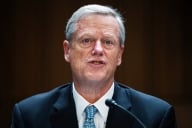You have /5 articles left.
Sign up for a free account or log in.

University of Michigan
Choosing a commencement speaker in recent years has become a risky endeavor, as universities sometimes run afoul of students who consider the selection too controversial or not a match for their political views. But the University of Michigan this year upset some students by not picking a speaker at all.
Instead, in conjunction with the institution’s 200th birthday, the April 29 commencement will weave in a multimedia presentation with pieces of previous commencement addresses and a commissioned fanfare in honor of the bicentennial.
Benj Pasek and Justin Paul, an Academy Award-winning songwriting duo, both alumni of Michigan and the lyricists of “City of Stars” from the film La La Land, will also perform.
These attractions appeared not to appease a contingent of students who have complained on social media about the university’s break with tradition.
Elisabeth Brennan, a Michigan senior, writing in the campus newspaper The Michigan Daily, asserted that university leaders hadn’t responded properly to student concerns about commencement -- questions and demands are habitually disregarded, and not just about commencement, she wrote.
“A simple and clearly articulated problem with a tangible solution was ignored in the name of prioritizing the university’s history and reputation above its students. Rather than celebrating the graduates -- the express purpose of a commencement ceremony -- the university is hijacking our day in order to celebrate itself,” Brennan wrote.
A Michigan spokesman, Rick Fitzgerald, wrote in an email to Inside Higher Ed that one commencement speaker often snatches the spotlight from graduates. Multiple alumni will be involved in the ceremony that day, he wrote, “more students than ever before.”
In a later phone call, Fitzgerald acknowledged that the university hadn’t expected such backlash from not booking a commencement speaker (the institution never pays its speakers).
In fact, most graduation-related complaints center on the selection of a speaker, Fitzgerald said. Angry letters come in, bemoaning the choice. Protesters camp outside commencement.
Such activities are typical at this time of year, and it’s more common for student or faculty acrimony to lead to graduation speakers withdrawing or the university’s picks being squashed. In the case of Ursinus College, the Fox News contributor Juan Williams was approached this year but ended up not being the pick after faculty objections.
Former Secretary of State Condoleezza Rice had agreed to deliver a graduation speech at Rutgers University in 2014. Students and faculty at the New Jersey institution called for a less controversial choice, and amid the pressure, Rice withdrew.
Other colleges never invite speakers. Bradley University, in Illinois, announced last year it would eliminate the speaker as a time saver, and Cornell University only schedules its president for graduation.
Roland Davidson, a senior at Michigan, said in an interview Tuesday that he understood student frustrations. Everyone is excited to learn who the commencement speaker will be every year, he said. When Davidson was a freshman and realized he was graduating in the school's 200th year, he was particularly pumped for his graduation speaker.
"It's a little bit of a slight, but it's not going to matter in two or three years," he said.
Davidson, also a Michigan Daily columnist, wrote on the paper's website Sunday that the university had “bucked” feedback from students, particularly those on a committee charged with advising the institution on the bicentennial celebrations.
“The university’s bicentennial should be a celebration of 200 years of excellence,” Davidson wrote. “Let’s be frank: this is likely a major fund-raising opportunity for the university by building a connection to its alumni. But I feel that the administration swung too far in that direction. Our commencement may be part of a larger ceremony, but it’s still our commencement! The university could have picked an alum to give our commencement speech, which would have allowed the administration to celebrate the bicentennial without sacrificing the address.”
Fitzgerald said the university always listens to students.
“We don’t always do exactly what our students wish we would do, but we always listen,” he said.








